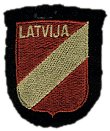A10 305 336
Baltic states, particularly Latvia. He is fluent in Latvian as well as German and he is presently retired. He testified that while working for the Displaced Persons Commission as an investigator he was assigned to investigate the Latvian Legion because at that time there was uncertainty about that organization's character (Tr. p. 12621). He interviewed General Rudolph Bangerskis, who was in charge of the Latvian Legion, Mr. Janums and other members of the Legion (Tr. p. 1263-12652). He concluded on the basis of his investigation that the Latvian Legion was strictly a military unit (Tr. p. 12663). The Displaced Persons Commission concluded that the Baltic legions were considered separate and distinct in purpose, ideology, activities and qualification for memberships from the German S.S., and therefore, the commission held them not to be hostile to the government of the United States under section 13 of the Displaced Persons Act (Tr. p. 12684). He also testified that the Waffen S.S. often was confused with the Allgemeine S.S. The Waffen S.S. meant literally the Weapons S.S., 4/ and after l943 it was composed primarily of conscripts like the Latvian Legion, while the General S.S., otherwise known as the Allgemeine S.S., was the Nazi party bodyguard element (Tr. p. 1275-12795, 13186). The Baltic conscripts were called volunteers by the Germans (Tr. p. 12787).
The witness testified that Latvians could not become members of either the Nazi party or the General S.S. because membership was only for Germans (Tr. p. 12798). He also testified that he was familiar with the Berlin document center and examined documents regarding the respondent (Tr. p. 12979). He saw nothing in those documents that would suggest involvement in war crimes.10 He also testified regarding the Arajs Commando. He said that the Arajs Commando was a group of Latvians under the Nazi command, the S.D., who participated in atrocities (Tr. p. 129011, 129512). He knew of no high ranking Latvian army officers who were members of this detail. He never knew of any person involved in atrocities who would have been permitted to leave the Arajs detail to join the Latvian Legion (Tr. p. 129313). He never came across any documents or information that the respondent was a member of either the Arajs detail or the S.D., (Tr. p. 129514). A district police chief had nothing to do with S.D. (Tr. p. 129415). He also stated that the Annas Street headquarters had not been involved in any atrocities and was not connected with the Riga police headquarters (Tr. p. 1311, 131216).
| 4/ | The word "waffen" in German means literally weapons. |
17
| 1 | Testimony of M. Paul Hartman, 1-May-1978, direct, transcript pp. 1260–1312. |
| 2 | Testimony of M. Paul Hartman, 1-May-1978, direct, transcript pp. 1260–1312. |
| 3 | Testimony of M. Paul Hartman, 1-May-1978, direct, transcript pp. 1260–1312. |
| 4 | Testimony of M. Paul Hartman, 1-May-1978, direct, transcript pp. 1260–1312. |
| 5 | Testimony of M. Paul Hartman, 1-May-1978, direct, transcript pp. 1260–1312. |
| 6 | Testimony of M. Paul Hartman, 1-May-1978, cross examination, transcript pp. 1313–1333. |
| 7 | Testimony of M. Paul Hartman, 1-May-1978, direct, transcript pp. 1260–1312. |
| 8 | Testimony of M. Paul Hartman, 1-May-1978, direct, transcript pp. 1260–1312. |
| 9 | Testimony of M. Paul Hartman, 1-May-1978, direct, transcript pp. 1260–1312. |
| 10 | Hartman confirms what the INS already knew based on communications they had received from German authorities in 1975. |
| 11 | Testimony of M. Paul Hartman, 1-May-1978, direct, transcript pp. 1260–1312. |
| 12 | Testimony of M. Paul Hartman, 1-May-1978, direct, transcript pp. 1260–1312. |
| 13 | Testimony of M. Paul Hartman, 1-May-1978, direct, transcript pp. 1260–1312. |
| 14 | Testimony of M. Paul Hartman, 1-May-1978, direct, transcript pp. 1260–1312. |
| 15 | Testimony of M. Paul Hartman, 1-May-1978, direct, transcript pp. 1260–1312. |
| 16 | Testimony of M. Paul Hartman, 1-May-1978, direct, transcript pp. 1260–1312. |
